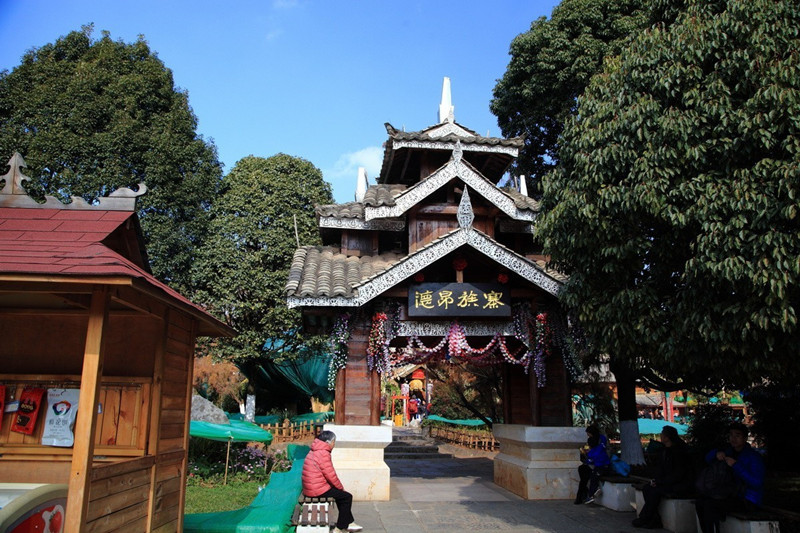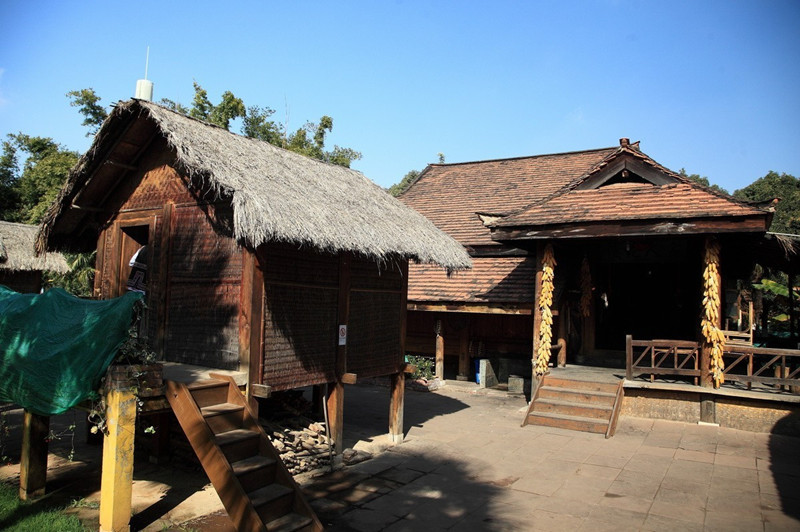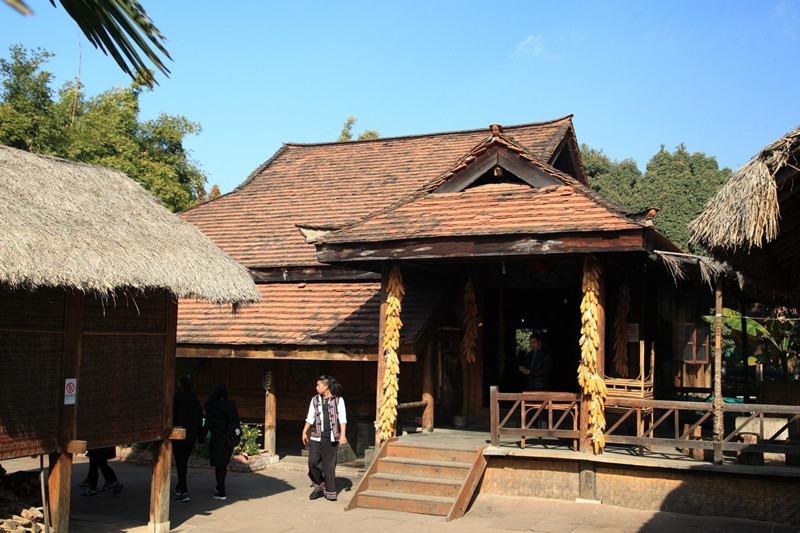This article is about how to get toYunnan Ethnic Villages from Kunming. Located 10 kilometers from the city center of Kunming, Yunnan Ethnic Villages display the colorful folklore and architecture of 25 ethnic groups residing in Yunnan Province including the Yi, Dai, Miao, Jingpo, Wa, Hani, Naxi, Dulong, etc. Through various displays and re-creations of the original villages, the Yunnan Ethnic Villages shows a variety of buildings, lifestyles, and religious beliefs in the region, which is a microcosm of Yunnan’s colorful and diverse ethnic culture.
How to Get to Yunnan Ethnic Villages from Kunming Downtown
There are two ways for you to get to Yunnan Ethnic Villages fom Kunming Downtown. Those are by bus or by taxi.
By Bus
You can take public bus No.24, 44, and 73 to Yunnan Ethnic Village Bus Station. No.24 bus have 24 stations, and the 23th station is the Yunnan Ethnic Villages. There are 18 ststions of No.44 bus, and the 17th station is the destinaion. No.73 bus have 20 stations and the 19th is the Yunnan Ethnic Villages.
Bus Schedules
| Bus Number | Departure Station | Terminate | First Bus | Last Bus | Tickets Price |
| No.24 | Kunming Railway Station | Haigeng Park | 06:30 | 21:30 | CNY2 |
| No.44 | Kunming Railway Station | Haigeng Park | 06:30 | 22:00 | CNY2 |
| No.73 | Huguo Road | Haigeng Park | 06:30 | 22:00 | CNY2 |
City Bus No.24(Departs every 20mins)
Stops: Kunming Railway Station(昆明站), Shuanglong Mall(双龙商场), Shuanglong Bridge(双龙桥), Tofuying(豆腐营), Sajin Lane Entrance(洒金巷口), the junction of Green Shade Avenue(绿荫大道路口), the junction of Rixin Road(日新路口), Qianweiying(前卫营), Dazhuang Village(大庄村), the junction of Shuanghui Road(商汇路口), the junction of Guangfu Road(广福路口), Kunming Tongren Hospital(昆明同仁医院), Taiijia River(太家河), Taihe Village(太河村), Qianwei West Road(前卫西路), the junction of Dianchi Road(滇池路口), the junction of Hongta East Road(红塔东路口), Yunnan Ethnic Village(云南民族村), Haigeng Park(海埂公园).
City Bus No.44(Departs every 15mins)
Stops: Kunming Railway Station(昆明站), Shuanglong Mall(双龙商场), Shuanglong Bridge(双龙桥), the junction of Huachang Road(华昌路口), Yanjiadi(严家地), Jinniu Housing Estate(金牛小区), Fuhaixiang(福海乡), Zhenghe Housing Estate(正和小区), the junction of Guangfu Road(广福路口), Yudui Village(渔堆村), Daba Village(大坝村), Hewei Village(河尾村), Xigong Wharf(西贡码头), Dianchi Lake Resort Management Committee(滇池度假区管委会), Dianchi Road(滇池路), the junction of Hongta East Road(红塔东路口), Yunnan Ethnic Village(云南民族村), Haigeng Park(海埂公园).
City Bus No.73(Departs every 20mins)
Stops: Huguo Road(护国路), Jinma Fang(金马坊), the junction of Jingguo Road(靖国路口), Mile Temple(弥勒寺), Gongren New Village(), Huachang Road(华昌路口), Yanjiadi(严家地), Jinniu Housing Estate(金牛小区), Fuhaixiang(福海乡), Zhenghe Housing Estate(正和小区), the junction of Guangfu Road(广福路口), Yudui Village(渔堆村), Daba Village(大坝村), Hewei Village(河尾村), Xigong Wharf(西贡码头), Dianchi Lake Resort Management Committee(滇池度假区管委会), Dianchi Road(滇池路), the junction of Hongta East Road(红塔东路口), Yunnan Ethnic Village(云南民族村), Haigeng Park(海埂公园).
Tips
If you travel to Yunnan in winter, you also can take these buses to Haigeng Park to see the sea gull.
By Taxi
Taking taxi from downtown to Yunnan Ethnic Village takes about 30 minutes.
Transportation Facilities within the Tourist Site
| Quadricycle with 2 or 4 seats | CNY 100/vehicle (three hours) |
| Balance bike | CNY 80/hour |
| Electro car with 2 seats | CNY 80/hour |
| Sightseeing mini-train | CNY 30 per person |
| Sightseeing boat | CNY 20 per person |
| 13-seat battery car | CNY 500/car (two hours) |
| 7-seat battery car | CNY 300/car (two hours) |
Transportation in Yunnan:
- Airlines in Yunnan
- Flights to Yunnan
- Airport Transfer
- International Flights to Yunnan
- Airports in Yunnan
- High-speed Rail in Yunnan
- Railway Stations in Yunnan
- Railways in Yunnan
- Trains to Yunnan
- Trans Asia Railway
- Metro in Yunnan
- Bridges in Yunnan
- Freeways in Yunnan
- Highways in Yunnan
- Roads to Yunnan
- Trans-Asia Roads
- National Roads in Yunnan
Architectural Features of Deang Village
The architecture of Deang Village includes the traditional Deang big house, capable of accommodating dozens of people, small houses topped with felt hats, and romantic large and small public houses. There are also significant structures such as the “Longyang Tower” (龙阳塔) and Buddhist prayer halls and pagodas.
Deang Ethnic Minority Overview
The Deang (德昂) ethnic group is unique to Yunnan, with a population of over 20,000, mainly distributed across Dehong Prefecture (德宏州) and Baoshan City (保山市) in the counties of Luxi (潞西), Lianghe (梁河), Ruili (瑞丽), Longchuan (陇川), and Longyang (隆阳). The Deang people predominantly practice Theravada Buddhism, with their folk activities closely linked to Buddhist ceremonies. Similar to the Dai (傣) ethnic group, important festivals include the Water-Splashing Festival (泼水节, also known as the Flower-Splashing Festival), Door-Opening Festival (开门节), and Door-Closing Festival (关门节). The traditional attire of the Deang is colorful, and oral literature, especially folk songs, is widely celebrated, with a distinctive tea culture.
Architectural Style and Living Conditions
Deang residential buildings are primarily constructed in a stilt-style with bamboo and wooden structures topped with grass. The architectural layout accommodates communal living, including the large Deang house and various smaller romantic structures. The customs of building sand pagodas during the Water-Splashing Festival are well reflected here. Traditional festivals for the Deang include the Water-Splashing Festival, Door-Closing Festival, Door-Opening Festival, and various other rituals like making arrangements and burning white firewood. The Water-Splashing Festival (locally referred to as “Jiaohua Water”) is an annual traditional celebration occurring on the seventh day after the Qingming Festival (清明节), lasting three days in total.
Cultural and Religious Practices
The Deang are devout Buddhists, with most villages having their own Buddhist temples and monks, including young novices (小和尚) who have entered the monastery. The Deang have a custom of dancing during major festivals, with the “Water Drum Dance” (水鼓舞) being a unique ethnic dance known in the Deang language as “Gagelingdang,” typically performed during celebratory events.
How to Get There
To reach Deang Village in Kunming, you can take a flight to Kunming Changshui International Airport (昆明长水国际机场) and then use local transportation options like buses or taxis to the Yunnan Ethnic Village. Alternatively, if you’re already in Kunming, you can use public transportation to reach the village.
Travel Tips
- Best Time to Visit: The Water-Splashing Festival is a great time to experience local culture.
- Local Customs: Respect local traditions, especially during religious events.
- Photography: Ask for permission before taking photos of people, especially during festivals.
- Culinary Delights: Don’t miss trying local dishes and tea, reflecting the rich cultural heritage of the Deang people.



Chinese Name: 云南民族村之摩梭之家
English Name: Village of Mosuo Ethnic People in Yunnan Ethnic Villages, Kunming
Location
The Village of Mosuo Ethnic People is part of the Yunnan Ethnic Villages, which is a large cultural park located in Kunming, the capital city of Yunnan Province. The park is dedicated to showcasing the diverse cultures and traditions of Yunnan’s ethnic groups. The Mosuo Village is nestled near the shores of the scenic Lugu Lake and reflects the authentic living environment of the Mosuo people.
Introduction
The Village of Mosuo Ethnic People features traditional “Mulen Houses” (木楞房) made entirely of wood logs, showcasing the simple yet elegant architectural style of the Mosuo people. These houses are built in the form of a courtyard with buildings on all four sides, known as “Mosuo Homestead” or “Silu Yuquwa,” which means “log house.” The Mosuo people, a branch of the Naxi ethnic group, predominantly reside in the Yongning area of the northwest Yunnan Plateau by Lugu Lake. The population of the Mosuo people is around 80,000. They still retain their matrilineal clan system and matrilineal family lifestyle, practices that have attracted anthropologists worldwide and have added an element of mystique and exoticism to the Mosuo culture.
Mosuo Culture and Customs
Housing and Architecture:
The Mosuo houses are constructed using a unique method of stacking logs horizontally to form walls, creating buildings known as “Mulen Houses” (木楞房). These houses have good thermal insulation properties, reflecting the Mosuo people’s adaptation to their natural environment. The traditional courtyard houses usually include a main house, a sutra hall, a flower house, and a gate tower.
Matriarchal Family Structure:
The Mosuo people still practice a matrilineal family system. The grandmother’s room, located in the main house facing south, is the heart of the Mosuo household. This room serves as the sleeping area, guest reception space, and a place for family discussions and religious activities. The Mosuo grandmother holds the highest status in the family, managing finances and making important decisions.
Marriage Customs – “Walking Marriage”:
The Mosuo practice a unique marriage system known as “walking marriage” (阿注走婚). In this system, men do not marry women, and women do not marry men. Instead, men visit their partners at night and return to their own families in the morning. The relationship is based on mutual affection and is known as “Azhu” (阿注), which means friend. Children born from these unions are raised by their mother’s family, and the uncle (mother’s brother) plays a significant role in their upbringing.
Religion and Beliefs:
The Mosuo people are followers of Tibetan Buddhism, also known as Lamaism. Their homes often feature a sutra hall where religious ceremonies are conducted. These halls are adorned with Buddhist statues, prayer wheels, and butter lamps, creating a serene and spiritual atmosphere.
Traditional Festivals and Activities:
During festivals, Mosuo girls offer butter tea, perform dances, and sing traditional songs like “Ma Da Mi” (玛达咪). They also engage visitors in rowing traditional pig-trough boats, showcasing their vibrant cultural heritage.
Best Time to Visit
The best time to visit the Village of Mosuo Ethnic People is during spring and autumn when the weather is pleasant and conducive to outdoor activities. These seasons are ideal for experiencing traditional festivals and engaging in cultural activities. The Mosuo people’s annual Torch Festival and Mizhi Festival, celebrated with much enthusiasm, offer unique insights into their rich cultural heritage.
How to Get There
To reach the Village of Mosuo Ethnic People, visitors typically first travel to Kunming, the capital of Yunnan Province. Kunming is well-connected by air, rail, and road to major cities in China. From Kunming, the Yunnan Ethnic Villages can be easily reached by taxi or public bus, located about 8 kilometers southwest of the city center. The park is a popular tourist attraction, and transportation options are readily available.
Useful Travel Tips
- Cultural Respect: The Mosuo people have unique customs and traditions. Visitors should be respectful of local practices, especially those related to their matrilineal society and religious beliefs.
- Photography: Always ask for permission before taking photos of local people, especially during ceremonies or in private settings.
- Local Cuisine: Be sure to try traditional Mosuo dishes, such as yak butter tea and “pipa meat” (a type of preserved pork). These dishes provide a taste of authentic Mosuo flavors.
- Festivals: If possible, plan your visit to coincide with Mosuo festivals to experience the rich cultural activities, such as dancing, singing, and boating in traditional pig-trough boats on Lugu Lake.
- Shopping: Local handicrafts, including handwoven textiles and silver jewelry, make excellent souvenirs and support the local economy.
How to Get to Yunnan Ethnic Villages from Kunming City Centre
This article is about how to get toYunnan Ethnic Villages from Kunming. Located 10 kilometers from the city center of Kunming, Yunnan Ethnic Villages display the colorful folklore and architecture...
Village of Deang Ethnic Minority in Yunnan Ethnic Villages, Kunming
Architectural Features of Deang Village The architecture of Deang Village includes the traditional Deang big house, capable of accommodating dozens of people, small houses topped with felt hats, and...
Village of Mosuo Ethnic People in Yunnan Ethnic Villages, Kunming
Chinese Name: 云南民族村之摩梭之家 English Name: Village of Mosuo Ethnic People in Yunnan Ethnic Villages, Kunming Location The Village of Mosuo Ethnic People is part of the Yunnan Ethnic Villages,...
Beijing World Youth Academy Students Education Tour in Yunnan Ethnic Villages
Organizing an educational tour for students from Beijing World Youth Academy to Yunnan’s ethnic villages can be both enriching and educational. Here’s a structured approach to plan such a...
Tips Before Travel
Bring copies of your passport
Don't assume you're restricted to the main hubs of Beijing and Shanghai, our tours can start from any city.
Register with your embassy
For your safety, please register with the Embassy.
Always have local cash
Exchange some local currency for your trip
Our Team
Customize a Trip
Start planning your tailor-made holiday to China by contacting one of our specialists. Once enquired, you’ll get a response within 0.5~23.5 hours.














